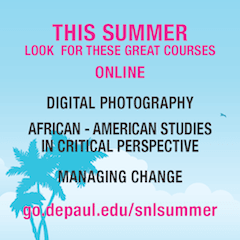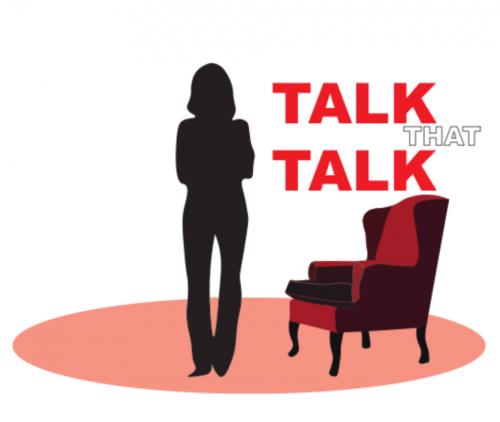
Connection is the key to conversation, awareness, and change. For the second annual TedxDePaul talks, DePaul University’s extraordinary students, alumni, and faculty members will be discussing their interpretation of the theme “Courage to Connect” on April 18. Hundreds of people applied to share their story and put their ideas into action on the iconic stage, but only ten people were chosen.
“I’ve always wanted to speak at a TEDx event,” DePaul alumna Nelly Mueller said. “I think they’re so valuable as a platform for sharing, and I felt especially compelled to apply because it was with a community that’s given me so much.”
The audition process was simple, record a video of yourself outlining what your talk would be about and how you would fit into the theme of “Courage to Connect.”
“My audition tape was pretty simple,” Jameson Dixon Jr., job fair and events manager for the DePaul Career Center, said. “I talked about why I felt my story was connected to the theme and the overall goal of my talk. It was a pretty straightforward video.”
DePaul junior Rachel Pride said she got her application in in the nick of time.
“It’s a funny story, actually,” Price said. “I knew the application deadline date and assumed that submissions would be accepted until 11:59 p.m. that day. It wasn’t until about 3:45 p.m. on the due date that I read that the application was due at 5 p.m., and I was still at Lurie Children’s Hospital finishing up my volunteer shift. So once I finished cleaning up the playroom, I ran to the bathroom, recorded a quick proposal and took a Lyft back to my house to submit the application, which I luckily had written a few days prior.”

Each person interpreted the “Courage to Connect” theme differently based on their own life experiences.
Elisabeth Lindsay-Ryan, an equity, diversity and inclusion adjunct faculty member at the School for New Learning interpreted the “Courage to Connect” in terms of discussions of race.
“I interpret the “Courage to Connect” theme in terms of racial justice, holding oneself accountable, being open to feedback, and talking to your children about race,” Lindsay-Ryan said. “Some people think kids are too young to have these conversations with, but parents of color don’t have the same option. Fifty percent of white parents don’t talk to their kids about race. You have to be willing to have those open conversations.”
Doris C. Rusch, an assistant professor of game design, found the “Courage to Connect” theme to be a perfect chance to discuss how she’s been feeling her whole life in terms of her connection with game design.
“I think we need connection more than ever–to be able to connect to ourselves and others to create a better world,” Rusch said. “When we feel connected, everything is possible. When we feel disconnected, that’s when a lot of issues arise and become insolvable. It takes courage to connect, because needs could remain unmet or if we connect with ourselves, we might not like what we find. It’s great to have tools at hand-like game design that can facilitate connection, provide structures and frameworks for it.”
Once selected, it was evident to the participants that writing and re-writing the perfect TedTalk is no small feat.
“Oh man, I had probably a dozen drafts,” Mueller said. “I mean, really, it ended up being about four official drafts, but the talk has been evolving as I discovered more and more what I really wanted to talk about. It wasn’t really difficult because, as you’ll see, it’s more of a reflection on my experiences. It’s almost like a re-telling of what I’ve learned up to this point. So, as you could probably guess, editing it down tended to be more difficult than the actual writing, but it’s been rewarding every step of the way.”
For many of the speakers the reflections on their experiences and how they grew up
up plays a huge role in what their talks are about.
Pride was born to two physician parents in Dallas, and has been serving her communities in both Dallas and Chicago.
“Growing up with two physician parents taught me that underneath socioeconomic status, race, ethnicity, religion and beyond, we are all humans deserving of love, respect and dignity,” Pride said. “Their dedication and constant service to others has inspired me for as long as I can remember, propelling my aspirations to be both a doctor and a constant advocate for global health equity.”
Dixon Jr. was the fourth of 13 children, and a first-generation college student. He spoke of the difficulties and successes of the way he grew up.
“Being a first generation college student in a way was a lot of pressure,” Dixon Jr. said. “You don’t really have a guide or someone you can trust who has been through the process of college before, so it’s like you have to kind of figure things out on your own which sometimes made it easier to make mistakes. Having so many siblings taught me how differently people communicate and understand each other.”
Communication and conversation seem to be a key part of how many of the TedxDePaul speakers approached their talks.
“I think we are all hoping to inspire, but I personally want to get the conversation about increasing minorities in finance going throughout Chicago and beyond,” said Brian Thompson, an entrepreneur and adjunct finance and economics faculty member.
Kelly Richmond Pope, an associate professor in the School of Accountancy and Management Information Systems, wants to spark open-minded conversations.
“My talk is called ‘Why We Hate Whistleblowers,”’ Richmond Pope said. “I hope people are introspective and reflective of their own view of whistleblowers, and are honest about their true feelings. It’s important to take a step back and reflect.”
For most of the speakers, introspection and reflection are important aspects of being able to continue the conversations and actions needed to change the world long after the TedxDePaul talks end.
“I honestly just hope people feel more compelled to communicate and connect,” Mueller said. “Starting the conversation won’t change everything instantly, but I think it’s an important and especially necessary step towards understanding. I remind myself every day when I get frustrated by ignorance: I know action is better than awareness, but you can’t take action if you aren’t aware. So I try to make it my responsibility to make others more aware. I hope others choose to pick up that responsibility after hearing my talk.”
Pride, whose talk is called ‘Courage to Disconnect,’ hopes audience members will
spend less time on their phones and more time actively serving their community.
“I hope that after watching my talk, people realize that it doesn’t take that much time to make an astronomical impact on your community and in turn, the world,” said Pride. “We have the distinct privilege to get a college education — a privilege shared by only seven percent of the world’s population —and it is imperative that we use this privilege to benefit those who may not be afforded the same opportunities. I’ve heard so many people complain about community service requirements for classes, organizations and beyond because they don’t have enough time to complete the requirements. My talk should serve as a wake up call to those people, especially if they spend a good portion of their time on social media.

